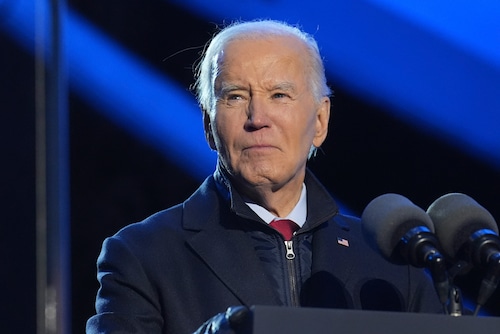By The Associated Press’s Colleen Long
Washington (AP) In addition to pardoning 39 Americans convicted of nonviolent offenses, President Joe Biden is reducing the sentences of about 1,500 inmates who were freed from jail and placed on home confinement during the coronavirus pandemic. It is the biggest act of clemency in modern history to occur on a single day.
Those who have been under home confinement for at least a year following their release are eligible for the commutations that were announced on Thursday. Some inmates were released in part to prevent the virus’s spread because prisons were particularly bad at transmitting it. According to an Associated Press count, 1 in 5 inmates had COVID-19 at one point.
President Joe Biden is pardoning 39 Americans convicted of nonviolent offenses and commuting the sentences of another 1,500 others. (Jacquelyn Martin/AP Photo, file)AP
Biden stated that he will continue to consider clemency requests and take more actions in the coming weeks. Just before he left office in 2017, Barack Obama performed the second-largest single-day act of clemency, at 330.
In a statement, Biden claimed that the promise of opportunity and second chances was the foundation upon which America was founded. In my capacity as president, I have the immense honor of showing mercy to those who have shown repentance and rehabilitation, giving Americans the chance to resume their regular lives and give back to their communities, and working to eliminate sentencing inequities for non-violent offenders, particularly those convicted of drug offenses.
The mercy comes after his son Hunter, who was charged with tax and weapons offenses, received a pardon overseas. Before the Trump administration takes office in January, Biden is facing pressure from advocacy organizations to pardon large groups of prisoners, including those on federal death row. Additionally, he is considering whether to grant preemptive pardons to individuals who looked into Trump’s attempt to change the 2020 presidential election results and who would face reprisals after he assumes office.
According to White House attorneys, those who were pardoned on Thursday had changed their ways and were found guilty of nonviolent crimes like drug offenses. They include a doctorate student in molecular biosciences, a church deacon who has served as a youth counselor and addiction counselor, a lady who directed emergency response teams during natural catastrophes, and a decorated veteran of the armed forces.
In the past, the president has granted 21 pardons and 122 commutations. Additionally, he pardoned former U.S. service men found guilty of breaking a now-repealed military prohibition on consensual gay sex and widely pardoned anyone found guilty of using and possessing marijuana on federal grounds and in the District of Columbia.
The president is being urged to pardon environmental and human rights attorney Steven Donziger by Rep. Jim McGovern, D-Mass., and 34 other lawmakers. Donziger was imprisoned or placed under house arrest for three years due to a contempt of court charge he faced for representing Indigenous farmers in a lawsuit against Chevron.
Biden is being urged by others to commute the sentences of federal death row inmates. Merrick Garland, his attorney general, put a stop on federal executions. Biden had stated throughout the 2020 campaign that he intended to abolish the death penalty, but he never followed through on his pledge. Now that Trump is back in office, it’s probable that executions will restart.
During the height of the pandemic, Trump oversaw an unprecedented number of federal executions during his first time in office.
Before Biden leaves office on January 20, further pardons will be granted, but it’s unclear if he will take any precautions against potential Trump prosecution—an unproven use of the authority. According to people familiar with the situation who spoke to The Associated Press on condition of anonymity to discuss internal discussions, the president has been considering the idea seriously for up to six months prior to the presidential election, but he has been worried about the precedent it would set.
The recipients of the pardons, however, would have to accept them. Such a pardon from Biden would be unnecessary, according to new California Senator Adam Schiff, who chaired the congressional committee that looked into the deadly Jan. 6 uprising. Schiff also stated that the president shouldn’t be spending his final days in office worrying about this.
The president can commute a sentence, which lessens or removes the punishment but does not absolve the offender of the crime, or pardon, which releases the offender from guilt and punishment. At the end of his tenure, it is usual for a president to show mercy by using his office’s authority to expunge records or terminate jail sentences.
Note: Every piece of content is rigorously reviewed by our team of experienced writers and editors to ensure its accuracy. Our writers use credible sources and adhere to strict fact-checking protocols to verify all claims and data before publication. If an error is identified, we promptly correct it and strive for transparency in all updates, feel free to reach out to us via email. We appreciate your trust and support!

